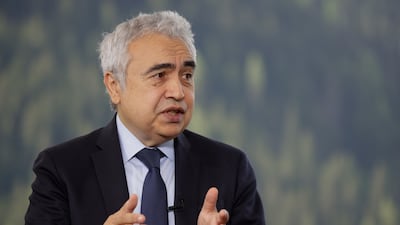The executive director of the International Energy Agency has called for Middle Eastern countries to accelerate their transition to clean energy.
Fatih Birol, who spoke to The National at Davos last month, said there are two key reasons why now is the right time to speed up the transition.
The region has “the financial muscles to have economic programmes diversified” as a result of high oil prices last year, with global oil and gas industry profits reaching about $4 trillion, he said.
The UN climate summit, Cop28, also represents a key opportunity for the region.
“You have the financial basis and also a very important milestone in the history of Middle East in terms of the transition,” Mr Birol said.
“I don't say that tomorrow they should cut down oil production, but now this transition needs to start.”
Mr Birol also said it was important for the UAE to host Cop28.
“This will be a historic opportunity for the UAE and the Middle East to show their international responsibility as a good international citizen,” he said.
“I believe the UAE has already been a very good example in terms of pushing the clean energy buttons, with renewable cities, nuclear power and its efficiency.
“I hope the [UAE] leadership will show that Middle East countries can transform their economies and make it much more sustainable in the future … and I hope that UAE will be remembered after Cop28 as the country that changed the destiny of Middle East economies.”
Mr Birol spoke of the significance of having Dr Sultan Al Jaber, Minister of Industry and Advanced Technology, as the Cop28 President-designate.
“I believe with all his experience, Dr Sultan has a role to play to show the right way for the Middle East oil and gas producers to accelerate the clean energy transition,” he said.
“Middle East countries, especially those whose economies rely on oil and gas revenues, need to diversify as soon as possible because oil demand will not increase forever.”
He said there were a number of indicators that show a trend towards reduced oil demand, with the top among them the rise of electric vehicles.
At the start of the decade, only three out of 100 cars sold in the world were electric, while last year that figure was almost 15 out of every 100.
It is predicted that by 2030, “every second car sold in China, US and Europe will be an electric car and it may even go higher”, he said.
executive director of the International Energy Agency
Mr Birol acknowledged that for some countries in the region, energy transition has already started, but “the pace is very slow” for the Middle East as a whole.
In addition to the imperative of combating climate change, Mr Birol said transition is important for individual economies that are reliant on oil and gas revenues.
“If there is less demand for oil, revenues will go down and economies will be weakened,” he said.
Mr Birol expects oil prices to be stable for the immediate future, while recognising that how Opec+ moves and China’s economy are two key variables.
“I expect with the gradual reopening of China and the responsible position of Opec+ countries, we will see price levels at what we are witnessing now,” he said.


